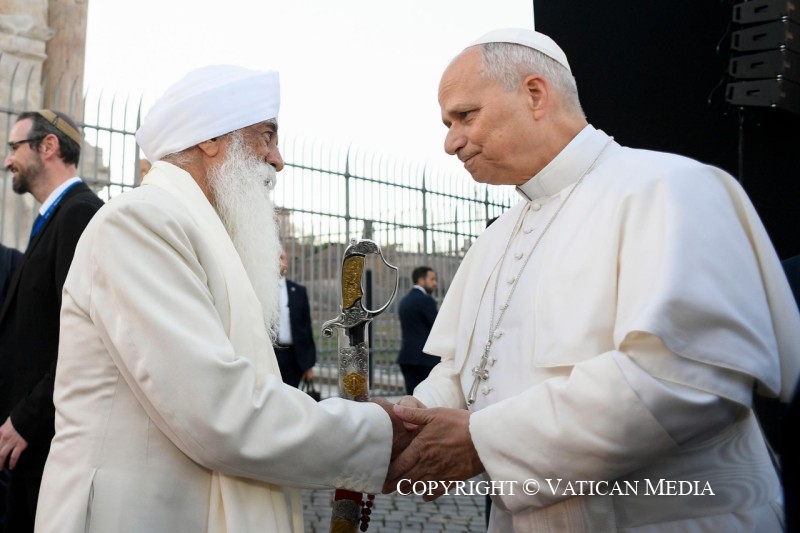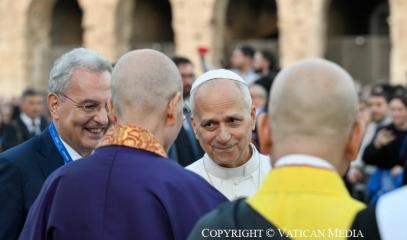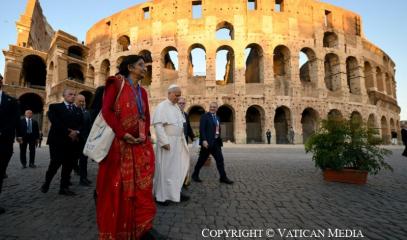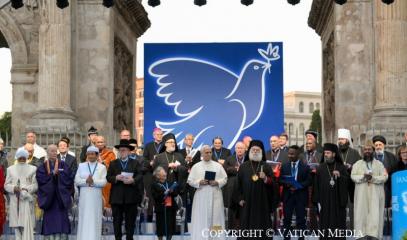Leo XIV expresses hope that the prayers of religions for peace can change the history of peoples
On the 60th anniversary of the Conciliar Declaration Nostra Aetate, the pontiff joined other religious leaders in the meeting in the "spirit of Assisi" promoted by the Community of Sant'Egidio. “Those who practice religion without prayer run the risk of misusing it, even to the point of killing,” Leo said. Instead, “with hands raised to heaven and open to others, we must ensure that this period of history, marked by war and the arrogance of power, soon comes to an end”.
Rome (AsiaNews) – Pope Leo XIV joined religious leaders at Rome’s Colosseum to pray at the Community of Sant'Egidio's annual Meeting for Peace, in the "Spirit of Assisi," inaugurated by Saint John Paul II with the historic first gathering on 27 October 1986.
This was the pontiff’s first time at this important interreligious event, in which he stressed that “only peace is holy, because it is willed by God”. Today’s event marked the end of a three-day gathering packed with meetings and testimonies to “dare peace”.
The meeting coincided with an important anniversary, namely the 60th anniversary of the promulgation of Nostra Aetate, the Second Vatican Council's declaration on the relationship between the Church and non-Christian faiths. The pontiff will dedicate tomorrow's general audience to this theme, which will be attended by delegations from many religious groups from around the world.
In the afternoon, Leo XIV made the "spirit of Assisi" his own, when he joined in an ecumenical prayer shared by representatives of Christian Churches (including Metropolitan Anthony, representing the Patriarchate of Moscow) in the Colosseum, while other groups prayed for peace in nearby places, each following their own religious tradition.
“Today, it seems that the world has gone in the opposite direction, but we embrace the challenge of Assisi and the awareness of our shared task and responsibility for peace,” Leo said.
Addressing those who still view such meetings with suspicion, he explained that, for the Catholic Church, “prayer in the ‘spirit of Assisi’ is based on the solid foundation set out in the Second Vatican Council's Declaration Nostra Aetate”.
Citing the document, he added that, “We cannot truly pray to God as Father of all if we treat any people as other than sisters and brothers, for all are created in God’s image. All believers are brothers and sisters. And religions, as ‘mothers,’ must encourage peoples to treat each other as family, not as enemies.”
It is precisely the importance of each person's prayer that Leo XIV underlined. Addressing the other religious leaders, he said: “I thank you for coming here to pray for peace and for showing the world just how important prayer is. The human heart must be open to peace. It is through meditation that we open our hearts, and in prayer that we go beyond ourselves. We recollect ourselves in order to go beyond ourselves. This is our witness: offering the immense treasures of ancient spiritualities to contemporary humanity.”
People are “thirsting for peace,” the pope noted. “We need a true and sound era of reconciliation that puts an end to the abuse of power, displays of force and indifference to the rule of law. Enough of war, with all the pain it causes through death, destruction and exile!”
For him, “prayer is a powerful force for reconciliation. Those who practice religion without prayer run the risk of misusing it, even to the point of killing. Prayer is a movement of the spirit and an opening of the heart. It is not shouting words, displaying behavior or religious slogans against God’s creatures. We have faith that prayer changes the course of history. May places of prayer be tents of encounter, sanctuaries of reconciliation and oases of peace.”
“In the power of prayer, with hands raised to heaven and open to others, we must ensure that this period of history, marked by war and the arrogance of power, soon comes to an end, giving rise to a new era. We cannot allow this period to continue. It shapes the minds of people who grow accustomed to war as a normal part of human history. Enough! This is the cry of the poor and the cry of the earth. Enough! Lord, hear our cry!”
For the Holy Father, “The culture of reconciliation will overcome the current globalization of powerlessness, which seems to tell us that another era is impossible. Yes, dialogue, negotiation and cooperation are capable of addressing and resolving the tensions that arise in situations of conflict. They must do so! The necessary forums and people exist.”
“We share the desire for peace for all peoples,” Leo added. “We are the voice of those who are not heard and the voiceless. We must ‘dare peace’!” Yet, “Even if the world turns a deaf ear to this appeal, we are certain that God will hear our prayer and the cries of so many who suffer. God wants a world without war. He will free us from this evil!”










.png)










